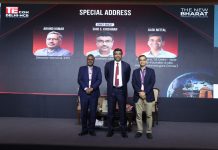@ Vikash Sharma | Sr Journalist
New Delhi: Even as India houses over 6.5 crore people who suffer from partial or complete hearing loss, its identification and timely remedial measures remains a cause of concern. Organized hearing aid industry typically sells 5 to 6 lakh units every year in India, which means over 99 percent of the population suffering from hearing loss remains vulnerable to bigger problems such as dementia, depression and balancing.
“It takes anything between 4 to 6 years for a person suffering from hearing loss to go for professional help. Identification of the problem remains a problem worldwide. Untreated hearing loss triggers problems including cognitive disorders, dementia, depression besides others,” says Mr Dave Fabry, Chief Innovation Officer, Starkey Hearing Technologies, who is currently on India visit to launch ‘Evolv AI’ – a high-tech hearing aid device capable of executing multi-functions.
The company is also actively working towards bringing out behavioral change in general public’s response towards the problem of hearing loss. Besides, as part of the industry, it is also pushing for regulation of the sector to solve the problem of low quality hearing aid devices. Come October 1st, the industry is expecting some regulation of the sector.
“We are working with stakeholders including central and state governments, medical professionals and others to increase awareness towards the problem,” says Mr Akhil Chauhan, Managing Director Starkey Hearing Technologies.
Explaining the technology used in ‘Evolv AI’, Chauhan says it will lay the groundwork for an entirely new hearing ecosystem that not only emphasizes the impact of hearing on overall health and wellness, but also creates an effortless user experience. Thanks to AI and machine learning, the hearing aids today are much more than one and have become a lifestyle device.
“Because of the advanced technology used in the smallest of hearing aids, it can perform up to 55 mln calculations per hour. Our hearing aids – study the sound quality of nearby environment and adjust accordingly to reduce unnecessary noise and provide better sound quality experience to the user,” he says adding the new technology reduce noise by about 40 percent thereby improving comfort and clarity significantly.
Dr Sugata Bhattacharjee, Doctor of Audiology at Starkey is upbeat about Indian market, as some states have started conducting OAE (Oto Acoustic Emissions) test to diagnose response of inner ear to the sound. The test, essentially is, meant for infants and children who may not be able to respond to behavioral hearing tests.
“If hearing aid is used at an early stage in kids, it helps them achieve their full potential. Not using hearing aid in kids, people who actually need it – triggers problems including cognitive disorders, dementia, depression and issues related to low confidence,” says Mr Dave Fabry adding that hearing aids today can monitor physical activity and social engagement, automatically detect falls, and serve as an intelligent virtual assistant, in addition to improving speech intelligibility in quiet and noisy listening environments.
















